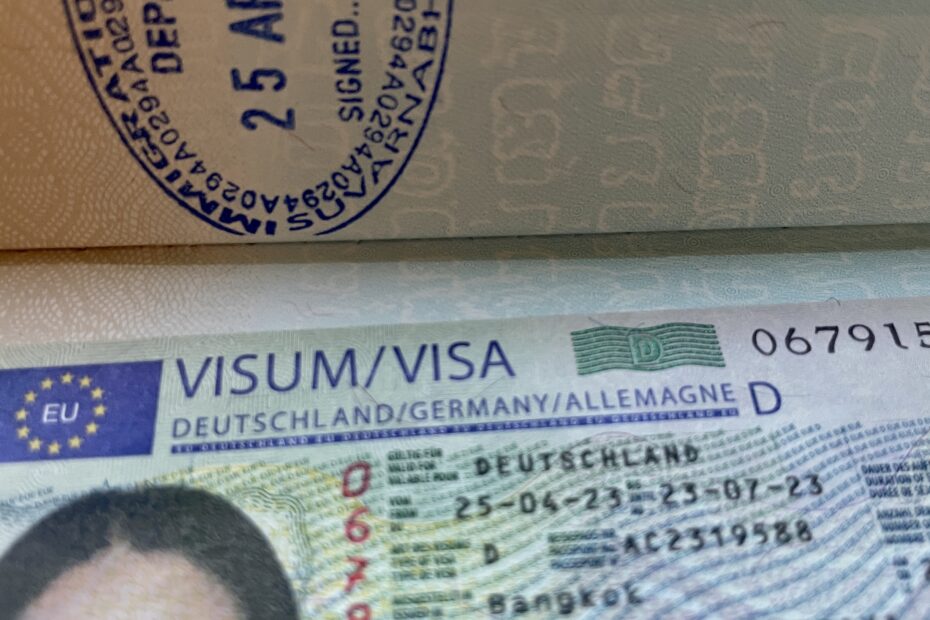A visitor visa for Germany allows foreigners to visit Germany and other Schengen countries for a specific period of time. This visa is usually for travel, tourism, visits to family or friends, business meetings, cultural or sporting events. In this article you will learn everything you need to know about the German visitor visa.
What is a Germany visitor visa?
The visitor visa for Germany is a Schengen visa. That means it gives you access to all 26 Schengen countries, not just Germany. This visa is normally issued for stays of up to 90 days in any 180-day period.
It is important to note that a visitor visa is not a work permit. If you plan to work in Germany, you need a different visa, eg a work visa.
How to apply for a visitor visa for Germany?
The process of applying for a visitor visa to Germany involves several steps:
- Check if you need a visa: Not all countries require a visa for short stays in Germany. Therefore, check the visa requirements for your country.
- Please, fill in the application: You must fill out and print the official application form. This form is available on the website of the German embassy in your country.
- Gather the required documents: You will need various documents, such as your valid passport, proof of Travel Medical Insurance, proof of sufficient financial means, a passport photo and, if necessary, other documents. Exact requirements may vary from country to country.
- Schedule an appointment: You must make an appointment at the German embassy or consulate in your country to submit your application in person.
- Pay the visa fee: The fee for a Schengen visa is currently 80 euros for adults and 40 euros for children aged 6-12. Children under the age of 6 are exempt from the visa fee.
- Wait for the decision: After submitting your application, it usually takes about 15 days for a decision to be made. In some cases, however, this process may take longer.
commitment declaration
A key aspect to consider when applying for a visitor visa to Germany is the commitment declaration. A letter of commitment is a document in which a German resident (the "host") promises to cover any costs that may arise during the visitor's stay. This includes living expenses, medical expenses and eventual deportation expenses.
A declaration of commitment can be decisive for the visa application, especially if the applicant cannot prove that they have sufficient financial means to finance their stay themselves. It is usually given by the inviting person in Germany at the local foreigners Authority delivered.
It is important to note that the letter of commitment is a legally binding commitment. This means that the signer must actually pay for costs incurred during the visitor's stay in Germany. Therefore, this decision should be carefully considered.
Invitation letter for a visitor visa
Another essential aspect when applying for a visitor visa for Germany is this letter of invitation. This letter is usually written by the person you wish to visit in Germany. It should include details such as the purpose of your visit, the length of your stay, where you will be staying during your stay, and the relationship between you and the person inviting you.
The letter of invitation is an important document that shows the willingness of the person in Germany to support you during your stay. It can be particularly helpful when you are applying for a visa for the first time or when you do not have sufficient financial means to stay.
Like the letter of commitment, the letter of invitation is proof that you are supported during your stay in Germany and that there is a legitimate purpose for your visit. It should therefore be written carefully and in detail and submitted together with the other required documents when applying for your visa.
Important instructions
The visitor visa application can be a complex process, especially for those doing it for the first time. However, it is important not to get discouraged. With careful planning and organization, the process can go relatively smoothly. It is always a good idea to allow enough time to prepare and gather all the necessary documents.
It's also helpful to remember that the process is designed to ensure that all visitors coming to Germany are doing so for legitimate reasons and that they are well taken care of during their stay.
In addition to the documents and processes already mentioned, in some cases it is necessary to provide additional documents or take steps. For example, medical certificates, police clearance certificates or letters of invitation from the inviting person in Germany may be required in some cases. Be sure to review all requirements for your specific country and situation.
It is also important to note that while the visitor visa application will be successful in most cases, there are no guarantees. Each application is reviewed individually and the decision is based on the information and documents provided. It is therefore essential to provide accurate and complete information.
If you are preparing the Germany visa application yourself, online sources and official websites can be very helpful in understanding what is needed and how the process works. There are also visa agencies that can help you fill out the application correctly and collect all the necessary documents.
Whichever path you choose, patience, preparation and understanding of the process will help you make the application a success. After all, a visitor visa to Germany is your ticket to an exciting trip, an inspiring cultural exchange or a valuable family reunion. It is well worth investing the time and effort in the application process!
Conclusion
The Germany Visitor Visa allows people from all over the world to discover this beautiful country and its culture, conduct business or simply spend time with loved ones. Although the application process may seem complex at times, careful preparation and compliance with all requirements, including providing a letter of commitment where necessary, can make it successful. With the right approach and planning, your dream of visiting Germany can come true!



